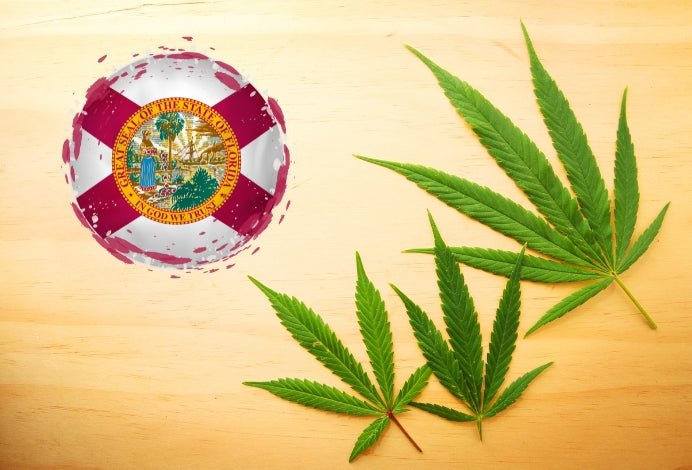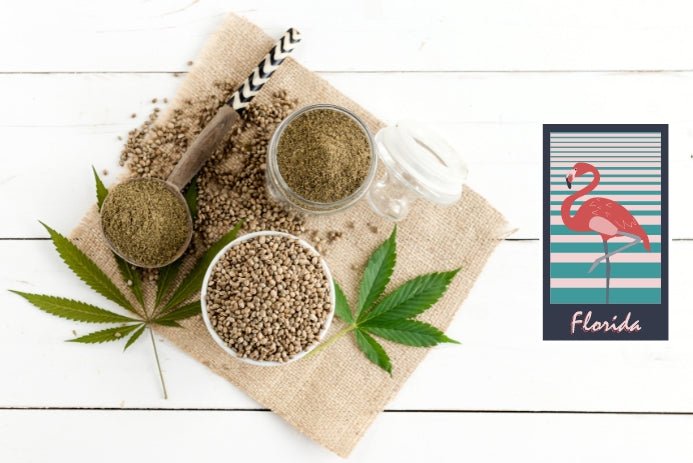As the State Supreme Court considers the legality of a ballot initiative to legalize adult-use marijuana in the state, lawmakers are trying to limit THC in potential recreational products proactively.

As the winter months begin to make way for springtime blossoming, state legislatures are once again bustling with activity. One of the issues confronting several of those legislative bodies is the legalization of recreational cannabis and the subsequent regulations necessary to govern and guide the respective state markets.
For marijuana reform activists and stakeholders, the most valuable potential prize for 2024 is the enigmatic yet financially imposing state of Florida, where a group of cannabis legalization reformers are attempting to add a marijuana reform initiative to the 2024 election ballot.
In August 2022, the "Smart & Safe Florida" political committee began its campaign to push for adult-use cannabis legalization. Through its initiative, the "Adult Personal Use of Marijuana" proposal, the campaign has collected enough signatures to qualify for this year's ballot placement. However, this past June, ​Florida's Attorney General, Ashley Moody (R), submitted a brief asking the state Supreme Court to invalidate the measure from the 2024 ballot, claiming that it misleads voters as written.
If the court rules the measure is legally valid and is subsequently approved by at least 60% of voters this coming November, it would add an amendment to the Florida State Constitution allowing people 21 or older "to possess, purchase, or use marijuana products and marijuana accessories for non-medical personal consumption by smoking, ingestion, or otherwise."
While the court has still not announced its decision, Gov. Ron DeSantis (R) recently stated his belief that the Supreme Court will rule in favor of the measure, allowing it to be a part of the ballot in 2024. “I think the court is going to approve that, so it’ll be on the ballot,” the governor said at his final campaign event in New Hampshire last month.
In anticipation of that outcome, State Rep. Ralph Massullo (R) introduced legislation last month that would place a substantial cap on THC concentrations significantly lower than what’s available in most state markets.
His measure would have set a 10% THC limit for all smokeable cannabis products and a 60% limit for all other forms of marijuana, such as extracts. In addition, the bill would set a total package limit of 200 milligrams of THC for edible cannabis offerings, with individual servings limited to only 10 milligrams.
This past week, the House Healthcare Regulation Subcommittee began debating the bill. According to numerous media outlets, subcommittee members eventually passed the controversial measure but not before first adopting an amendment added by Massullo substantially increasing the proposed cap on THC levels in marijuana flower from the original 10% to 30%. Following that significant adjustment, committee members voted 13-4 to approve the bill.
“Due to a variety of reasons, we’re only at the beginning of understanding the potential long-term benefits and harms of high-potency THC marijuana products,” Massullo told subcommittee members, noting that his proposed limits “will only take effect if the constitutional amendment is adopted.”
Before the vote took place, Massullo reiterated the motivation behind his bill, saying, “I’m not going to tell you my opinion on recreational marijuana, but I will say this: We are tasked with keeping the public safe. It’s important that we think about that with a long-term vision and not be reactive.”
"I’m not going to tell you my opinion on recreational marijuana, but I will say this: We are tasked with keeping the public safe. It’s important that we think about that with a long-term vision and not be reactive."
- Florida State Rep. Ralph Massullo (R) - The Bill's Sponsor
Despite the committee members' overwhelming approval, several lawmakers expressed their concerns with the proposed bill. Rep. Robin Bartleman (D), the panel’s ranking Democrat, said she voted against the measure because “I don’t believe we should be piecemealing this.” She instead proposed that her colleagues adopt “a more comprehensive package,” including a host of adult-use cannabis regulations and guidelines.
“I’d rather wait and deal with everything at once,” Bartleman said.
"I don’t believe we should be piecemealing this. I’d rather wait and deal with everything at once."
- Florida State Rep. Robin Bartleman (D)
Similarly, Rep. Kelly Skidmore (D), while applauding the bill for “being visionary and looking forward,” shared her trepidations with the legislation, saying caps on THC levels are just one of many items lawmakers will need to confront if the ballot measure is approved.
“How are we going to regulate that? Who’s going to get those licenses? Is it going to be in every convenience store?” she asked. “I think there are many, many things that we need to talk about and discuss, and this is just a little bit premature for me.”
"How are we going to regulate that? Who’s going to get those licenses? Is it going to be in every convenience store? I think there are many, many things that we need to talk about and discuss, and this is just a little bit premature for me."
- Florida State Rep. Kelly Skidmore (D)
One of the main problems with the measure for many committee members concerns the illicit black market. If state officials impose overly restrictive THC limits, many consumers will just fall back on the unregulated cannabis sector. For some on the committee, that outcome could lead to a myriad of other health and crime-related consequences.
Rep. Gallop Franklin II (D), who voted to support the bill, said, “Oftentimes, you know, people are driven to the illicit marketplace. It’s not regulated at all.”
Rep. Adam Anderson (R), who also voted in favor of the measure, pointed out another unintended outcome of low THC limits in which individuals begin to consume vaster amounts of marijuana “to get the effects that they want”—a concept known as self-titration. “They’re going to be smoking more and more of the plant, which might have other additives and other materials that could potentially be harmful,” he said.
"They’re going to be smoking more and more of the plant, which might have other additives and other materials that could potentially be harmful."
- Florida State Rep. Adam Anderson (R)
For many political insiders and State House observers, Masullo’s bill and all the grandstanding over “public safety” are just vote-seeking noise for politicians trying to figure out which way the wind is blowing in their mercurial and paradoxical state. For others, it is another unwarranted and uneducated attack on an industry that doesn’t exist yet. It might behoove all concerned parties to wait and see how it all plays out before trying to legislate “fixes” and “changes” for a system that may not require any.








































